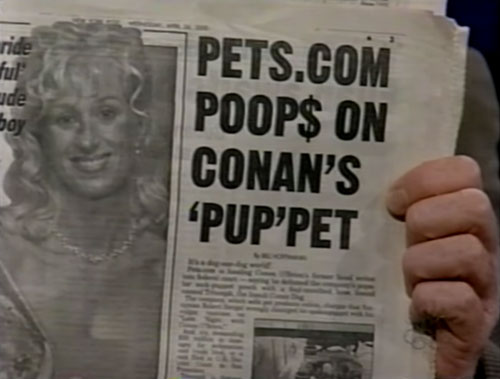All Sock Puppets Go To Heaven
If someone were to create an online store like Pets.com today, it probably would've worked. So why did it fail miserably back in 2000? A few reasons.
$17M
The amount that Pets.com spent on advertising in the second quarter of 2000, according to MarketWatch—its first full quarter on the stock market. Much of that advertising, of course, went toward promoting its famed sock puppet. Despite this massive amount of spending, the company’s revenue was just $8.8 million during that period. By November 6, 2000, the day before the presidential election, the company announced it was shutting down operations. (Fun fact: The voice of the sock puppet, which is still sold online for some reason, is Michael Ian Black. He described the job as "painful," due to all the hand movement.)

Conan O'Brien revealing to the world that Triumph the Insult Comic Dog had been sued by Pets.com. (YouTube screenshot)
Why Pets.com came to life in the first place
The fascinating thing about Pets.com is that the whole thing—from launch to liquidation—lasted 27 months. If Tedium makes it to April (crossing our fingers), it will have lasted longer than Pets.com did as an online store.
But it made a lot of moves that few companies that last less than three years tend to make: It had an ad on the Super Bowl; it acquired one of its largest rivals; it went public on the stock market; and it sued someone (specifically, Conan O’Brien’s former head writer) for libel. And it did all four of those things within a six-month period.
It was like the company had decided to live its entire life in accelerated form, like it was a guinea pig making way for a better idea. (Which would make sense: Guinea pigs have a lifespan of as little as 5 years. An even better comparison might be the gerbil, which has a lifespan of three to four years.)
So, where did this company come from, and why did it grow so insanely fast?
Well, like a small bird, it was incubated, then after it hatched, allowed to fly away. The firm was developed by a company called WebMagic, which specializes in two things: Buying good domains and spinning off companies based on those domains.
WebMagic’s founder, Greg McLemore, was early to the online game. Before he started pets.com, he ran toys.com, which billed itself as “the Internet’s largest online toy store” upon its 1996 launch. (It was bought by eToys soon after.)
He didn’t do anything with his pet-related domain right away, instead using it as a forwarding site for his other amazing domain name, but there was a persistent Harvard Business School student that nudged him to try to build a business from it. Carolyn Everson had a seed of an idea, and wanted to build out an online pet store. McLemore didn’t want to sell the domain, but he was willing to work with Everson on building out the idea—to bring the (at the time) $23 billion pet product category to the internet.
Soon, they secured venture capital funding, and a CEO was hired on. That CEO, Julie Wainwright, happened to know Amazon founder Jeff Bezos. Not long after that, Amazon took a 50 percent ownership stake and threw in even more money.
And soon, Pets.com was off to the races.
“When I had to really abandon the dream of starting Pets.com, I have to be honest and tell you those first couple of weeks were devastating. I was really, really down and I wasn't quite sure what to do next. And then I realized that I am just graduating from B-school, I have great experience, I'm going to be an asset to another company. I had to get my feet back on the ground and get my confidence back.”
— Carolyn Everson, explaining in a video for CNN Money the feelings of heartbreak she had after she left Pets.com due to a clash with Wainwright over operations differences. Emerson ended up graduating from business school without a job, turning down multiple job offers due to the belief that she would be running Pets.com. Fortunately, it worked out for Everson, possibly better than anyone else involved with Pets.com: She’s the VP of Global Marketing Solutions at Facebook.

The Pets.com sock puppet at the Macy's Thanksgiving Day Parade. Yes, this happened. (YouTube screenshot)
Did Pets.com fail because it was too early? Its CEO once made the case in a comment thread
When online pet stores, such as Chewy, come to life, it’s inevitable that they’re going to get compared to Pets.com. Because it seems like, on a surface level, the company with the best possible domain name for such a service already proved that the idea doesn’t work.
But the issue is much more complicated than that, and the evidence is made clear by comments that Julie Wainwright made in response to one of those articles.
After a company named PetFlow was written up by Business Insider with the headline “ Someone is Trying the Pets.com Idea Again,” Wainwright—frustrated that PetFlow co-founder Alex Zhardanovsky dinged her former company for selling products below cost—spoke up in the comments section.
Her comments are insightful, if defensive. She noted that startups these days have numerous advantages available that Pets.com didn’t have way back when, which drove up the costs severely.
“There were no plug and play solutions for e-commerce/warehouse management and customer service that could scale, which means that we had to employ 40+ engineers,” she noted. “Cloud computing did not exist, which means that we had to have a server farm and several IT people to [ensure] that the site did not go down.”
And while numerous other companies that filed for bankruptcy, like Webvan, had massive losses before shutting their doors, Pets.com, she says, did the noble thing: Realizing it wouldn’t get the investments it needed to move forward due to the venture capital market’s collapse, it shut down operations, liquidated its assets, and gave the money back to the investors.
That meant selling off the domain name (which PetSmart bought in December 2000 for an undisclosed price) and the sock puppet (which, in a nice bit of foreshadowing for the next bubble, went to a firm that sells subprime loans— subprime auto loans, to be specific).
Some of those involved in the failure struggled with the negative mark left in the public sphere. Wainwright, for one, laid low for a while. But not anymore. In recent years, she’s bounced back in a major way with The RealReal, an online consignment shop that is actually generating the kind of revenue and venture capital that Pets.com struggled with during its demise.
Greg McLemore’s WebMagic, meanwhile, hasn’t spun off a company as big as Pets.com since—but still has a lot of good domains just sitting around, waiting for someone to buy them, so another big win is always possible. McLemore, who runs the International Arcade Museum and is a major vintage arcade game collector, appears to have fairly warm memories of his time running the site, then spinning it off—the WebMagic website states that they had no regrets about the initial investors.
However, he blames also-ran competitors for hurting the online store’s chances—though even as rough as the competition became for pets.com, things would have been even worse had they leaned into B2B work.
“The B2B businesses tended to have twice as many stupid competitors as the Internet retailers experienced,” the site states. “As such, we were one of the few top-tier Internet development houses that did not launch pre-IPO B2B plays.”
And as for Jeff Bezos? Well, his company Amazon—oh, you’ve heard of it?—has spent the last 22 years building out all the infrastructure and cloud capacity that Pets.com didn’t have in 2000, then selling it to startups, so that the next Pets.com actually has a chance to survive on its own merits.
What a concept.
Recently, I read a story about an entrepreneur who did something very similar to what Greg McLemore did in 1994—a guy who bought the right domain at the right time.
The guy’s name? Warren Royal. The guy’s domain? Bobbleheads.com. Royal has been around quite a long time, and spent time running BBSes before he got into the internet business. When the dot-com bubble burst, he left it for a while, and moved into another industry that knows a thing or two about bubbles: The mortgage industry.
When the bubble burst there, Royal went back to the internet, looked around for interesting domains, and waited. Royal knew little to nothing about bobbleheads when he spent $29,000 on Bobbleheads.com in 2007. He just knew they were interesting.
“I didn’t know a single thing about the bobblehead business, and wasn’t exactly sure what I would do with it, but I knew it was the type of name that you could build a business around,” Royal told DomainInvesting.com in 2008.
He soon had success playing off the election year, and that success grew after he realized that there was an amazing business model to be had in custom-made bobbleheads—and he figured out that there were factories that could actually pull it off.
Like Pets.com was way back when, Bobbleheads.com is a site known for stunts, like sending a Donald Trump bobblehead into the stratosphere. But that’s where the similarities end. Bobbleheads.com is a site that has all of the advantages of knowing what happened in the past. Royal lived through two bubbles, so he knew the pitfalls. He slowly turned his great domain into a better business.
“Everything I did before was intangible—tech is intangible, mortgages are intangible, even the systems we bought during the Internet craze were all intangible systems. This is tangible,” he told The Huffington Post in 2012. “You can hold it in your hands and show it to people and take it home and see smiles on people’s faces. It’s very low tech, but something you can hold in your hand, which is far more fulfilling to me.”
I wonder if, had Pets.com tried to slow its roll when entering the market, we might be telling a different story today. Greg McLemore’s prospecting instincts way back when were sound. But once venture capital money got involved, the goal seemed to be to become a major company as quickly as possible—a path that offers no room for failure.
If they had made room for failure, maybe we wouldn’t have gotten an entertaining sock puppet out of the deal. But Pets.com is too good a domain name to be relegated to use as a forwarding domain for PetSmart.
If you don’t want your business to have the lifespan of a gerbil, perhaps it’s OK not to aim for insane heights. It’s OK to aim lower—most people would be plenty happy with a hit bobblehead store, rather than a well-remembered online failure.
It’s just cat litter, after all.
:format(jpeg)/2017/06/tedium011217.gif)
/2017/06/tedium011217.gif)

/uploads/ernie_crop.jpg)